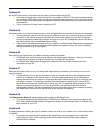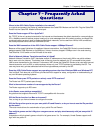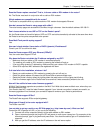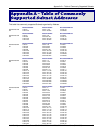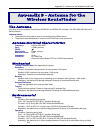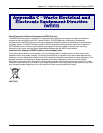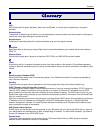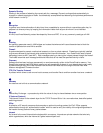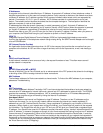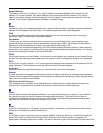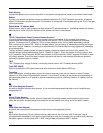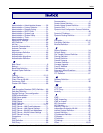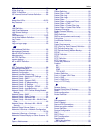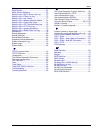
Glossary
Multi-Tech Systems, Inc. RouteFinder SOHO RF820/RF820-AP & RF830/RF830-AP User Guide (S000399E) 87
Dynamic Routing
Routing is the process of selecting the correct path for a message. Dynamic routing adjusts automatically to
changes in network topologies or traffic. It automatically accomplishes load balancing and optimizes performance
of the network “on the fly.”
E
Encryption
In general use, the transformation of data into a form unreadable by anyone without a secret decryption key. Its
purpose is to ensure privacy by keeping the information hidden from anyone for whom it is not intended.
Ethernet
A LAN (Local Area Network) protocol developed by Xerox and DEC. It is a very commonly used type of LAN.
F
Filtering
An operating parameter used in LAN bridges and routers that when set will cause these devices to block the
transfer of packets from one LAN to another.
Firewall
A system designed to prevent unauthorized access to or from a private network. Firewalls are typically installed
to give users access to the Internet while protecting their Internal Information. Your RouteFinder uses a firewall
technology known as NAT (see NAT). Each message entering or leaving the intranet passes through the firewall.
The firewall examines each message and blocks those that do not meet the specified security criteria.
Firmware
Software that has been has been permanently or semi-permanently written to the RouteFinder’s memory. Your
RouteFinder supports flash ROM which means you can upgrade the firmware in your network device very easily
by downloading a copy of the new firmware from the Multi-Tech Web site and using the RouteFinder Web
browser management Firmware function.
FTP (File Transfer Protocol)
A protocol which allows a user on one host to access, and transfer files to and from another host over a network.
G
Gateway
An entrance and exit into a communications network.
I
IKE
Internet Key Exchange – a procedure by which the value of a key is shared between two or more parties.
IP (Internet Protocol)
The Internet Protocol is the network layer for the TCP/IP Protocol Suite. It is a connectionless, best-effort packet
switching protocol.
IPSec
A collection of IP security measures that comprise an optional tunneling protocol for IPv6. IPSec supports
authentication through an “authentication header” which is used to verify the validity of the originating address in
the header of every packet of every packet stream.
Intranet
An Intranet is the use of Internet technologies within a company. Intranets are private networks that exist only
within organizations, while the Internet is a global network open to all.



